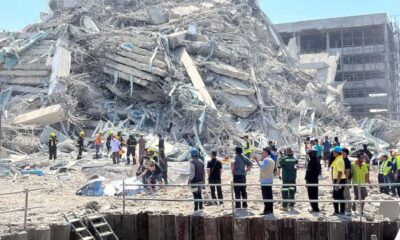World
Trump vows March 4 tariffs for Mexico, Canada, extra 10% for China over fentanyl

U.S. President Donald Trump on Thursday said his proposed 25% tariffs on Mexican and Canadian goods will take effect on March 4 along with an extra 10% duty on Chinese imports because deadly drugs are still pouring into the U.S. from those countries.
Trump told reporters in the Oval Office that the fresh tariffs on Chinese imports would stack on top of the 10% tariff that he levied on Feb. 4 over the fentanyl opioid crisis, resulting in a cumulative 20% tariff, Reuters reported.
Trump first announced the new duties on Chinese imports in a post, opens new tab on his Truth Social site that he would impose the additional 10% tariff, effective March 4.
In the post, Trump said drugs, namely fentanyl, were still coming into the U.S. at “very high and unacceptable levels,” with a large percentage of them the deadly opioid fentanyl.
Trump told reporters he decided to add the extra tariffs on China and stick to the Tuesday deadline for Canada and Mexico given what his administration sees as insufficient progress on curbing fentanyl flows into the country.
Asked if Mexico and Canada had made enough progress on curbing fentanyl shipments into the U.S., Trump said: “I don’t see that at all. No, not on drugs.”
“There are ongoing discussions with the Chinese, Mexico and Canada,” a White House official told Reuters. “We’ve gotten a good handle on the migration issue, but there are still concerns on the other issue of fentanyl deaths.
Sources told Reuters that Mexico will extradite to the United States drug lord Rafael Caro Quintero, who was convicted in 1985 of murdering a U.S. Drug Enforcement Administration agent but released in 2013 and returned to trafficking.
According to the Centers for Disease Control, 72,776 people died from synthetic opioids in 2023 in the U.S., chiefly from fentanyl.
FOREIGN AID FREEZE
Customs and Border Patrol agents seized 991 pounds of fentanyl at the southwest border in January 2025, down 50.5% from a year earlier, but still enough to kill many millions of Americans, the White House official said.
Trump’s move to blame Mexico and Canada for the continuing flow of fentanyl into the U.S. comes as his freeze on American foreign aid is disrupting efforts to fight the illicit trade.
Reuters reported on Monday that his aid freeze has stalled the planned expansion of a United Nations program to help the Mexican Navy better screen cargo and interdict fentanyl ingredients and other contraband, and other activities.
Also hampering U.S. drug interdiction efforts is a decision by U.S. Customs and Border Protection to delay implementation of a ban on duty-free low-value package shipments from Canada, China and Mexico until better screening can be implemented.
TARIFF TACTICS
Trump’s decision to ratchet up tariffs on Chinese goods mirrors his moves to escalate tariffs during his first-term trade wars with Beijing until serious trade negotiations took place between the world’s two largest economies.
Dean Cheng, senior adviser at the U.S. Institute of Peace, said the rising tariffs were part of a broad push by Trump to respond to Chinese challenges that also included the State Department’s removal of wording about not supporting Taiwan independence to tougher scrutiny of U.S.-listed Chinese companies.
“It’s all the pieces on the chessboard,” he said.
The Chinese embassy had no immediate comment.
Thus far, Chinese President Xi Jinping has not engaged in negotiations over fentanyl, instead applying limited 10% retaliatory duties on U.S. energy and farm equipment.
But Beijing could push back harder as Trump’s new tariffs reach 20% on U.S. imports from China, on top of existing duties of up to 25% imposed during Trump’s first term. U.S. imports from China totaled $439 billion last year, according to U.S. Census Bureau data.
Piling on more tariffs could pose risks to both the Chinese and U.S. economies. China has been struggling with a property crisis and weak domestic demand, while U.S. inflation remains sticky and interest rates are elevated.
China, in a letter to U.S. Trade Representative Jamieson Greer, called for equal dialogue and consultation.
Trump has targeted early April for implementing broader “reciprocal tariffs” to match the import duty rates of other countries and offset their other restrictions.
During a news conference on Thursday, Trump downplayed the potential inflationary impact of tariffs for Americans, arguing that his first-term tariffs on China raised hundreds of billions of dollars without negatively affecting the U.S. economy.
“I find that it’s not about inflation. It’s about fairness. And the inflation for us has not existed, and I don’t think it’s going to exist,” he said.
TARIFF, BORDER TALKS
Canadian and Mexican officials were due to meet with Trump administration counterparts in Washington on Thursday and Friday to try to forestall the tariffs, which could deal a serious blow to a highly integrated North American economy.
Mexican Economy Minister Marcelo Ebrard will meet with Greer on Thursday and Commerce Secretary Howard Lutnick on Friday.
Ebrard’s deputy, Vidal Llerenas, on Thursday said Mexico could adopt other trade measures beyond the recent tariffs it imposed on certain imports to reduce cheap shipments from China.
In Canada, Public Safety Minister David McGuinty said on Thursday that the progress Canada has made on tightening security along the border with the United States and combating drug smuggling should satisfy the Trump administration.
“The evidence is irrefutable – progress is being made,” McGuinty said in televised remarks to reporters in Washington ahead of two days of talks with U.S. officials.
“In my view, any test that was put on Canada in terms of showing progress and meeting standards for the border – I believe those have been met,” he said.
The Canada Border Services Agency said in a statement that it was launching a targeted, cross-country initiative to intercept illegal contraband arriving and leaving the country, with a focus on fentanyl and other synthetic narcotics.
World
Israel kills Hezbollah official in deadly Beirut airstrike

An Israeli airstrike killed four people including a Hezbollah official in Beirut’s southern suburbs on Tuesday, a Lebanese security source said, further testing a shaky ceasefire between Israel and Iran-backed Hezbollah.
The Israeli military said the official – Hassan Bdeir – was a member of a Hezbollah unit and Iran’s Quds Force, and he had assisted the Palestinian group Hamas in planning a “significant and imminent terror attack against Israeli civilians,” Reuters reported.
The Lebanese security source said the target was a Hezbollah figure whose responsibilities included the Palestinian file. The Lebanese health ministry said the strike killed four people – including a woman – and wounded seven others.
It marked Israel’s second airstrike in the Hezbollah-controlled suburb of Beirut in five days, adding to strains on the U.S.-brokered ceasefire that ended last year’s devastating conflict.
The attacks on Beirut’s southern suburbs have resumed at a time of broader escalation in the region, with Israel having restarted Gaza strikes after a two-month truce and the United States hitting the Iran-aligned Houthis of Yemen in a bid to get them to stop attacking Red Sea shipping.
Hezbollah lawmaker Ibrahim Moussawi said the Israeli attack amounted to “a major and severe aggression that has escalated the situation to an entirely different level”.
Speaking in a televised statement after visiting the building that was struck, he called on the Lebanese state to “activate the highest level of diplomacy to find solutions”.
Israeli Foreign Minister Gideon Saar said the eliminated Hezbollah operative posed “a real and immediate threat”. “We expect Lebanon to take action to uproot terrorist organizations acting within its borders against Israel,” he said.
Israel dealt severe blows to Hezbollah in the war, killing thousands of its fighters, destroying much of it arsenal and eliminating its top leadership including Hassan Nasrallah.
Hezbollah has denied any role in recent rocket attacks from Lebanon towards Israel, including one that prompted Israel to carry out an airstrike on the southern suburbs last Friday.
Tuesday’s strike in the early hours appeared to have damaged the upper three floors of a building, a Reuters reporter at the scene said, with the balconies of those floors blown out.
The glass on the floors below was intact, indicating a targeted strike. Ambulances were at the scene as families fled to other parts of Beirut.
There was no advance warning, in contrast to the attack on Friday when the Israeli military announced which building it intended to hit and ordered residents to leave the area.
Lebanese President Joseph Aoun condemned the latest airstrike, calling it a “dangerous warning” that signals premeditated intentions against Lebanon, which would intensify diplomatic outreach and mobilise international allies.
Lebanese Prime Minister Nawaf Salam said the strike was a flagrant breach of a U.N. Security Council Resolution upon which the ceasefire was based, and the ceasefire arrangement.
U.S. BACKS ISRAEL
The ceasefire agreement demanded that southern Lebanon be free of Hezbollah fighters and weapons, that Lebanese troops deploy into the area, and that Israeli troops withdraw.
But each side accuses the other of failing to implement the terms fully. Israel says Hezbollah still has infrastructure in the south, while Lebanon and Hezbollah say Israel is occupying Lebanese soil by not withdrawing from five hilltop positions.
The U.S. State Department said that Israel was defending itself from rocket attacks that came from Lebanon and that Washington blamed “terrorists” for the resumption of hostilities.
“Hostilities have resumed because terrorists launched rockets into Israel from Lebanon,” a State Department spokesperson said in an email, responding to a question from Reuters seeking reaction to Tuesday’s airstrike. Washington supported Israel’s response, the spokesperson said.
The Israel-Hezbollah conflict was ignited when Hezbollah opened fire in support of Hamas at the start of the Gaza war. It escalated in September when Israel went on the offensive, declaring the aim of securing the return home of tens of thousands of people evacuated from homes in the north.
The war uprooted more than a million people and killed at least 3,768 people in Lebanon, according to a Lebanese health ministry toll from November. Dozens more have been reported killed by Israeli fire since the ceasefire.
Lebanon’s figures do not distinguish between civilians and fighters.
During the war, Hezbollah strikes killed 45 civilians in northern Israel and the Israeli-occupied Golan Heights. At least 73 Israeli soldiers were killed in northern Israel, the Golan Heights, and in combat in southern Lebanon, according to Israeli authorities.
World
Trump says Zelenskiy wants to back out of critical minerals deal

U.S. President Donald Trump said on Sunday Ukrainian President Volodymyr Zelenskiy wants to back out of a critical minerals deal, warning the Ukrainian leader would face big problems if he did.
“He’s trying to back out of the rare earth deal and if he does that he’s got some problems, big, big problems,” Trump told reporters.
“He wants to be a member of NATO, but he’s never going to be a member of NATO. He understands that.”
(Reuters)
World
South Korea, China, Japan seek regional trade amid Trump tariffs

South Korea, China and Japan held their first economic dialogue in five years on Sunday, seeking to facilitate regional trade as the three Asian export powers brace from U.S. President Donald Trump’s tariffs.
The countries’ three trade ministers agreed to “closely cooperate for a comprehensive and high-level” talks on a South Korea-Japan-China free trade agreement deal to promote “regional and global trade”, according to a statement released after the meeting.
“It is necessary to strengthen the implementation of RCEP, in which all three countries have participated, and to create a framework for expanding trade cooperation among the three countries through Korea-China-Japan FTA negotiations,” said South Korean Trade Minister Ahn Duk-geun, referring to the Regional Comprehensive Economic Partnership.
The ministers met ahead of Trump’s announcement on Wednesday of more tariffs in what he calls “liberation day”, as he upends Washington’s trading partnerships.
Seoul, Beijing and Tokyo are major U.S. major trading partners, although they have been at loggerheads among themselves over issues including territorial disputes and Japan’s release of wastewater from the wrecked Fukushima nuclear power plant.
They have not made substantial progress on a trilateral free-trade deal since starting talks in 2012.
RCEP, which went into force in 2022, is a trade framework among 15 Asia-Pacific countries aimed at lowering trade barriers.
Trump announced 25% import tariffs on cars and auto parts last week, a move that may hurt companies, especially Asian automakers, which are among the largest vehicle exporters to the U.S.
After Mexico, South Korea is the world’s largest exporter of vehicles to the United States, followed by Japan, according to data from S&P.
The ministers agreed to hold their next ministerial meeting in Japan.
(Reuters)
-

 Business4 days ago
Business4 days ago36 mining contracts inked over the past year: Mines ministry
-

 Latest News4 days ago
Latest News4 days agoDried fruit market in Herat booms ahead of Eid-al-Fitr
-

 Regional4 days ago
Regional4 days agoPowerful quake in Southeast Asia kills several, Myanmar declares state of emergency
-

 Latest News4 days ago
Latest News4 days agoUS may ask for military equipment left behind in Afghanistan: Trump
-

 International Sports4 days ago
International Sports4 days agoLucknow’s six-hitting machine Pooran justifies top order slot
-

 Latest News3 days ago
Latest News3 days agoMore than 70,000 Afghans returned home in third week of March: IOM
-

 Latest News4 days ago
Latest News4 days agoNegotiations with Afghanistan are the only way forward: Pakistan’s ex-PM Khan
-

 Health3 days ago
Health3 days agoGlobal organizations warn of health crisis due to aid cuts in Afghanistan
























